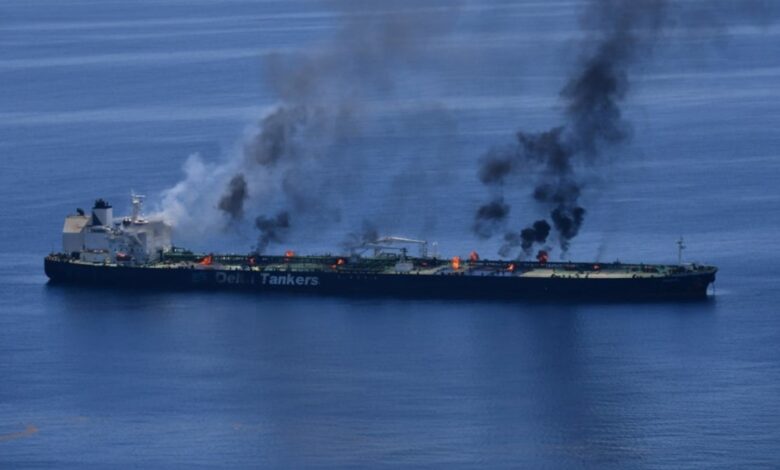Images of a burning oil tanker attacked by the Houthis

Yemen Monitor/ Reuters
The EUNAVFOR ASPIDES posted on X on Monday that the Greek-flagged crude oil tanker Sounion caught fire in the Red Sea since August 23rd following an attack by Yemeni Houthi rebels, with no clear signs of an oil spill.
The EUNAVFOR ASPIDES shared images on X, dated August 29th, showing a fire and smoke rising from the ship’s main deck. Reuters verified a Houthi video depicting a fiery attack on the vessel.
Shipping officials stated that the Sounion was carrying 150,000 tons of crude oil, posing a significant environmental risk.
ASPIDES noted that a portion of the Sounion’s superstructure was ablaze, with flames observed in at least five locations on the main deck. In the event of a spill, it could potentially be one of the largest spills on record. “The ship is carrying over 1 million barrels of oil,” said Lars Jensen, CEO of Vespucci Maritime, in a recent LinkedIn post. Jensen added that the risk of Houthi attacks would make it difficult to deploy ships to mitigate and clean up a spill if one occurred.
The Sounion is the third vessel operated by Athens-based Delta Tankers to be attacked by the Houthis this month.
Since late last year, the Houthis have been targeting commercial ships in the Red Sea and Gulf of Aden, and more recently, they have expanded their operations to the Indian Ocean. They claim to be targeting ships linked to Israel, which is conducting a brutal attack on the Gaza Strip. However, the Yemeni government and experts argue that the Houthis’ objectives are domestic, aimed at escaping internal crises and improving their image in the region.
In response, the US and UK have been conducting airstrikes against Iranian-backed Houthi militants since January 11th. As a result, the Houthis have announced an expansion of their operations to include US and British ships.
Since November 2023, the US Department of Defense (Pentagon) has recorded over 220 attacks on US commercial or military vessels off the coast of Yemen, including nearly 100 attacks since the start of US airstrikes on the Yemeni mainland.
In February, the EU launched a military operation in the Red Sea and Gulf of Aden called “ASPIDES,” aimed at combating growing security threats in the Red Sea, promoting freedom of navigation, and supporting regional stability. This was in response to the Houthis’ repeated attacks on commercial ships in the Red Sea, which disrupted trade and raised commodity prices.




